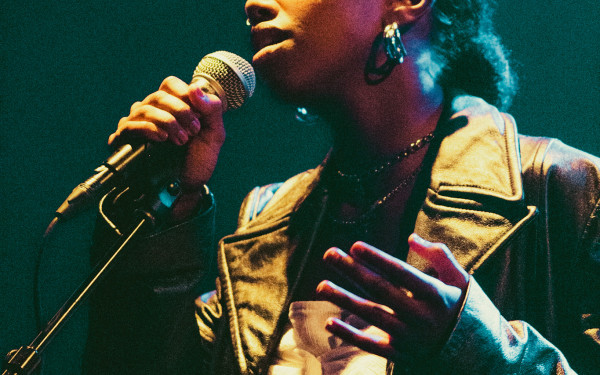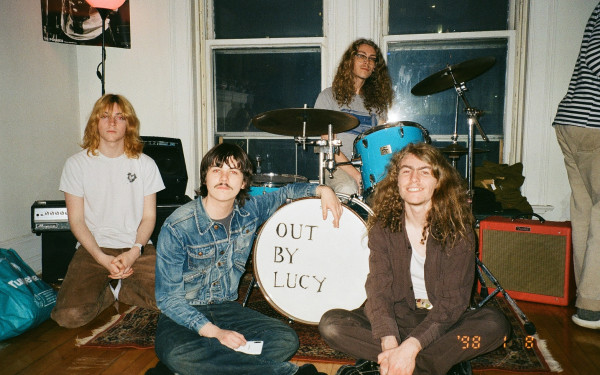Concordia Prof Organizes Benefit Concert for Families of Sainte-Foy Victims
The Yusra Benefit Show for Sainte-Foy Proves There’s Love to Go Around
It was just past midnight, but June was still dancing; warming the hearts of the attendees and restoring a feeling of positivity and hope that had been missing since the the Jan. 29 shooting that left six people dead, and seventeen kids without a father.
Her father, Ian Campeau—otherwise known as DJ NDN—and Bear Witness, are of the Nipissing and Cayuga First Nations, respectively. They’re also two parts of the three-person electronic music group, A Tribe Called Red, who came to close the Yusra benefit show last Friday.
The impromptu concert was pulled together by Iraqi-Canadian rapper, The Narcicyst—commonly known as Narcy. A collaborative effort between his collective The Medium and POP Montreal, the Feb. 10 show hosted a variety of musical acts—many of whom are friends with the well-known rapper.
“We’re here because Narcy is a close friend,” said Bear Witness. “He called me up to help support, and it was something that was an obvious ‘yes of course we have to come’ to support the fundraiser and the families.”
Tribe’s music video, “R.E.D.,” which features Narcy, Yasiin Bey and Black Bear, is currently up for a Juno Award as Video of the Year in 2017.
Ticket sales, donations and merch purchases were amassed for the families of the victims of the Sainte-Foy shooting. Dan Seligman, POP Montreal’s creative director, estimated that between $4,000 to $5,000 was collected.
The Medium is a Montreal-based collective lead by Iraqi-Canadian rapper, Yassin Alsalmad, or Narcy, but many Concordia students know him as their professor.
This semester, Narcy is teaching a class called “Bigger than Hip-Hop” in the Hall Building. DJ NDN and Bear Witness were guest speakers for last week’s class.
“Our class is very much about direct experience about what is going on,” explained Narcy, as he was administering a quiz to his students. “We take hip-hop as a context, but really it’s about current events.”
With recent events in Quebec City, the class discussion focused on exploring the effects and trauma of these types of incidents.
“We actually read some poetry from a book called In Times of Terror, Wage Beauty by Mark Gonzales. We had people share trauma and just, you know, open up a bit.”
Addressing social issues like xenophobia and Islamophobia have been consistent themes in Narcy’s work.
“It’s not new to us. I just keep doing what I do,” he said. “I just think that now people are listening more than ever.”
With that in mind, Narcy called out mass media as being “reactionary in their news coverage.” The problem, he explained, is that “there’s no regular positive news story that goes into the feed about people in our community.”
There are lots of talented musicians, visual artists and filmmakers who are creating and collaborating on high-level artistic projects, explained Narcy. Yet the spotlight still seems to overlook many of the strongest artists around him.
“[The media] tends to go to Muslims when something happens to Muslims or when Muslims ‘do something,’” he said.
“[The media] tends to go to Muslims when something happens to Muslims or when Muslims ‘do something.“— Yassin Alsalmad, Narcy
Highlighting people from various communities, showcasing their work—this is the change that happens at the front lines of media norms. Narcy said that the problem lies deep within institutional structure.
“The narrative that comes from the board room out to the editorial room, tends to be skewed,” he said. “There’s no voice present in that room. That’s where the change has to happen. We have to have professionals on the ground in every field, and to be there to consult.”
One of those professionals is Nantali Indongo.
2_700_1050_90.jpg)
While Indongo played a short twelve-minute set during the performance under her stage name Tali Taliwah, her long-time presence in arts and culture production at the CBC has made her the go-to person when it comes to issues of race around the newsroom.
“I don’t mind [being that person…] I embrace it,” she said. “I’ve been thinking about, living and dealing with race my whole life. And if I can’t give a valid answer, I will make sure to find the people who will.”
She echoed similar sentiments to those of Narcy. “In terms of diversity in institutions like the CBC, we need all the help we can get. People who are on the inside trying to chip away at things; people at the top trying to effect broader change.”
Indongo reiterated the fact that editorial leaders need to consider prioritizing stories that involve marginalized peoples, or participate in mainstream arts ongoing in ways that break from the status quo.
Her performance at the Rialto was candid. Sitting on a stool at the front of the stage, Indongo pulled out a red notebook before talking about the song she had finished composing the night before.
“I started thinking about a song, and what I wanted to say on Friday. I started to feel like there’s a huge lack of love going on,” she said. “We’ve gotten to this space and time where [we need to] just consider loving one another.”
1_700_1050_90.jpg)
On stage with her two bandmates, she said “We need to send love to Sainte-Foy.” The crowd actively listened, clapped, and sang with Indongo throughout her performance.
All of the evening’s performances brought the crowd together. Narcy performed a few songs on stage as well, but seemed to be making space for other artists to come and share their music with the crowd.
Then finally, just before midnight, following a precursor DJ set from Buddablaze, the guys from A Tribe Called Red hit the stage. While Bear Witness and DJ NDN mixed behind the booth, Campeau’s kid got the crowd going from the side—stealing everyone’s heart while wearing a knitted Pikachu hat.

3_700_1050_90.jpg)




